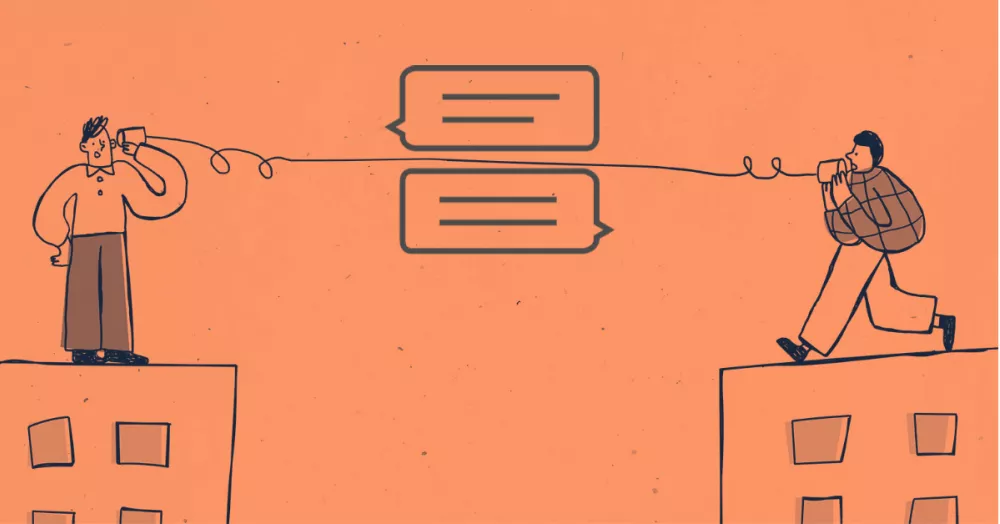5 Ways to Be a Better Communicator
Our self-expression is deeply linked to communication. Yet sometimes all of us struggle to express ourselves. Here are some tips to improve those skills.

So much of our day-to-day lives are dependent on communication.
From the moment we wake up to the moment we sleep, all of us, (including animals) exchange information, feelings, and emotions. We developed languages to easily share thoughts, survival plans, and to even attract partners. Communication and language are what connect us all.
But with the onset of media and technology, it seems like we have waived our loyalties to the spoken word. Though it would be unfair to acknowledge the advantages of technology (like reaching anyone in any part of the world with a tap of a screen, freedom of quick exchange of ideas, etc.), we now prefer texting over calling (and even cringe at getting unexpected calls), face timing over visiting, and LOL-ing over actually sharing a laugh with someone. Slowly but surely, these have accustomed us to extended periods of non-verbal, mostly digital conversations. So much so, that we find it easier to cozy back into our bubble rather than meeting new people and conversing with them.
If anything, the current pandemic has highlighted our innate need to be in touch with others. It has made us realize the importance of physical touch and in-person communication with our loved ones.
Effective communication is imperative for relationships. The way we express ourselves is unique and extremely valuable for conveying our authentic individuality, truth, and emotions. If we think about it, our voice is like your fingerprint- a simple, imperfectly perfect truth in its own way, that distinguishes us from the world.
We could camouflage behind tweets, or our picture-perfect digital realities, the fact is, we all need to work on communicating better. Contrary to what we might think, there are more than a few ways of honing communication's (dying) art. Here are 5 simple tips to improve conversations and become a better communicator.
Test of Three
Communication is not just about how you say something. It is about what you say as well. Deciding what we should tell others is important. We have all experienced this. We find out a juicy piece of information about a coworker or a neighbor, and we immediately pick up our phone to share it with someone, without thinking twice about its authenticity.
An effective way to improve our communication skills is to take a moment to reflect on the information and filter it against 3 simple questions. This test, called “Socrates’ Triple Filter Philosophy” or “Test of three”, is one of the many powerful approaches to justify whether the information we are about to share is useful or not.
The process starts with reflecting on the information and whether the knowledge or opinion that we’re about to share meets any of the following tests:
- Is true- Is there truth in these facts?
- Is it good? – Is this information good? Will it portray the person/ situation in a good light?
- It is useful? – Is the information going to be useful to the person you’re sharing it with?
More often than not, these three questions help us realize the genuineness and benefits of the information. So instead of blurting out random facts, and hurting someone in the process, we reassess, and in doing so, share information, which is credible in a clear, constructive manner. Being a good communicator is relaying chatter, knowing what to share when to share, and doing it responsibly.
Ask but also, listen
Communication, in its essence, is exchanging ideas and knowledge. The first step to a meaningful conversation is to ask apt questions. Many times, we dwell in finer details and digress. When we learn new information, it is important to ask questions that are important to the conversation.
The second step to a constructive exchange is only sharing our views, but also taking time to listen to others’ points of view. But very often, we find ourselves just hearing the other side, waiting for our turn to speak. Effective communication happens when we are actively listening to others, understanding, and absorbing their ideas or opinions.
This not only helps us better comprehend their train of thought but also aid in responding to them better. So instead of impatiently waiting our turn to speak, it is important to engage ourselves and listen actively.
Listening also means taking note of what is not being said. It also means reading the body language and listening to the tone of the person speaking. We often find that we truly understand someone when we listen to them not just for years, but also with our eyes.
Body Language
The current generation is aging before its time because of the largely sedentary lifestyles and neck-cranes due to the constant screen gazing. We seem to have forgotten that the first step to a good conversation is to face the person, sit attentively and express your views in a relaxed manner. Instead, during an in-person conversation, we end up mindlessly fidgeting with our phones, shifting on our feet, failing to make eye contact.
To improve your communication, it is important to be physically present for the conversation. You cannot pay attention to details if you are constantly worried by phantom vibrations, yawning, or gazing away. So next time you are in a conversation with someone, try to keep your phone away, relax, and connect with the person. Good body language and posture exude confidence, display credibility, and even impact the result of conversations.
Don’t fill in all silences
Occasional bouts of silence in a conversation are natural and sometimes even necessary. Effective communication demands proper pauses so that we are not interrupting others and gathering our own thoughts before we share them.
So instead of trying to fill the silences with awkward ideas, don’t be afraid to pause between conversations. This would give you time to think about your responses, absorb the views and opinions, and calm your senses (especially during a heated conversation).
Be self-aware
It’s common to lose track of yourself when you drown in a conversation. Especially in matters of sensitivity or interest, we let the discussion get the better of us and before we can notice, we are reacting to others’ opinions more than we’d prefer. Developing self-awareness can be a helpful trait as it helps you keep grounded even in adverse situations, put forth your intentions in the best way possible, and even take downfalls constructively.
Simple ways to hone self-awareness are to educate yourself as much as possible, learning to embrace your emotions and controlling them (by journaling, meditation), and trying to develop a wider perspective on life and all that comes with it. These habits can help us realize our true strengths and weaknesses and keep us on top of them.
We hope that these simple ways spark motivation and ideas that you can include in your daily life. A good conversation is an art and the only way to connect with someone on a deeper, intellectual level.
Let us know in the comments your tips and techniques that give you confidence and strike a conversation and we will add them to this list.








Comments
I'll definitely try these! Nicely written article